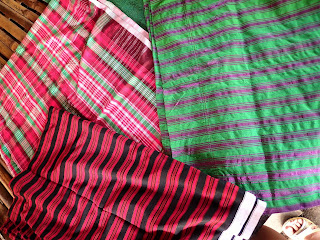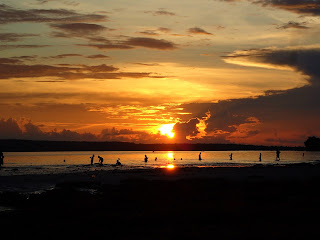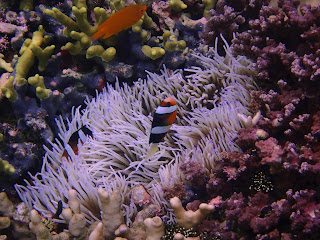Wakatobi – a strip of islands that consist of WA(ngi-Wangi),
KA(ledupa), TO(mia) and BI(nongko) that is part of Sulawesi Tenggara. It was
defined as a marine national park in 1995, and was declared by UNESCO as one of
the World Network of Biosphere Reserve in 2013 for its rich marine
biodiversity.
I made a trip to these islands, minus Binongko, with a
friend of mine last year, and still couldn’t find the right way to write about
it. But, here goes nothing. Hope I can do justice to this little paradise.
This trip took a total of 10 days – with 2 days to travel
from and to Jakarta.
We started it off from Tomia – 3 hours speedboat ride from Wanci
in Wangi-wangi. We actually wanted to go all the way to Binongko, but the
locals advised us not to do so as the sea was very rough at the time that it would
not be very safe to do so with the island being the outer most and is actually
closer to East Nusa Tenggara rather than to Sulawesi.
We spent 4 days in Tomia. Afterwards we spent a night in Hoga
island with a stop over at Kaledupa. From Hoga, we caught a boat to Wanci where
we stayed for 2 days. Then we boarded a ship for a 9 hour over night journey from
Wanci to Baubau in Buton island. We stayed for 1 night in Bau-Bau to have
enough time to explore one of the best preserved palace in Indonesia, that
belonged to Buton Sultanate, before flying back to Jakarta.
I went expecting to see its rich marine life. But, I was in
for some surprises.
Here are what I consider the top 10 must do and experience
when you visit Wakatobi.
1. Get into the water!
(of course!).
If you are a sea lover, whether you’re a diver or not, you
must visit Wakatobi at least once in your life to see its underwater life. And if
you’re a diver, I can assure you, Wakatobi has been regarded as one of the best
diving site in the world not for nothing.
I dived in some spots in Tomia, Hoga and Wangi-Wangi. And in
all these places, I was never disappointed.
Spots in Tomia and Hoga islands, in my opinion, have many to
offer. The corals are very healthy with minimum damage. Hoga has interesting
contours to explore – with caves and tunnels. Spots in Wangi-Wangi, have some
damage due to fishing activities some years back, although they have now
recovered.
2. Visit different Bajo
villages.
In Wakatobi, there are several Bajo villages. I would suggest that you visit two villages: Mola in Wanci, and Mantigola in Kaledupa.
Mola is the biggest Bajo village in Wakatobi, and the most developed and modern Bajo community in the world. It can easily be reached by car from Wanci, and has asphalt road right to the main gate. To me, wandering around this village felt like wandering around in any villages in Java. I no longer felt that the houses were built above the sea as there is concrete pavement and foundation.
A unique feature of this village, is a circular building built at one side of it. It was a meeting hall for Bajo tribesmen. Apparently, they have this yearly meeting of all Bajo tribes from many parts of the world. And with Mola being the biggest Bajo community in the world, it is then only natural that it is here a meeting hall is built.
In Kaledupa there are actually three Bajo tribes: Sampela, Lohoa and Mantigola. Mantigola, is the biggest of the three and is believed to be the root of all Bajo tribes in Indonesia.
Different from Mola, Mantigola is more traditional. Houses are still built on rocks or wooden pillars above the sea. To visit Mantigola you will need to take a short boat ride from Kaledupa.
People are very friendly and will gladly welcome you in their homes. We were guided by a local called Samsu who cheerfully talked to us about his life while taking us wandering around the village under the scorching sun.
 |
| A long bridge to get to where we should get into a small boat to go to Bajo Mantigola village |
 |
| On the 'katinting', the small boat that took us to the village |
3. Explore some history.
As what is commonly found in many parts of Indonesia, there
are always stories of old kingdoms and sultanate. The same, can also be found
in Wakatobi. There are fortresses, mosques, and palaces to be found, though in
various conditions.
Patua fortress in Tomia.
This is one of the unkept ones
though I think it must have been quite a big complex. There is no more fortress
in sight – what is left is only the rocky walls surrounding the complex. There
are graves in the middle of the complex, but there is no explanation of whose
graves those are.
This fortress must have been built to protect the island
because from one of the point one could see far away to the open sea. There
were at least 3 points of canons that I found as I walked around it.
 |
| don't get discouraged. It's not that high, really... |
 |
| What is left. This was newly built, so nothing ancient about this building |
 |
| The view to the open sea |
Ollo fortress and Masjid Agung (Grand Mosque) Bente in
Kaledupa.
It's located on a hill and is part of the ancient kingdom
in Kaledupa. The old mosque is well preserved – still with its original stone
walls and wood pillars.
Liya fortress in Wangi-wangi.
Just like Patua, there is no more fortress in sight, just
the rocky walls, and an old mosque that was built in 1500s. And there are also
graves that are said to be of those from the early Buton sultanate;s family.
4. Search for woven fabrics of Wakatobi (and Buton).
Weaving is an everyday activity done by many women on these islands. But it looks like that nowadays, this is only done by the older generation.
On each of these islands, though the weaving patterns look
similar, but it actually is quite different.
The weaving in Wangi-wangi is very much influenced by the
tradition from Buton Sultanate as it is the closest island to Buton, with certain colours associated with different
social occasion and/or certain rank in the society. Golden threads are often
used in Wangi-wangi.
That influence is not so apparent anymore as one travels
further from Wangi-wangi. Colours become deeper and patterns become simpler.
 |
| A lady we met in Tomia |
 |
| The woven fabric from Tomia |
 |
| We met her in Wanci |
 |
| A lot more colourful in Wanci |
 |
| She's put three children to the university only by creating beautiful woven fabrics. Her husband has passed away a long time |
 |
| The different patterns of weaving in Baubau, Buton island. Every pattern and colour signify different rank and used for different social occasions. It even has different names |
5. When in Tomia: do not miss Bukit Tomia and wait for the sunset.
This is the highest point in the island, from which you can
see two other islands nearby – Lentea and Tolandona.
6. Must visit Hoga
island, and spend time on its long stretch of white sandy beach.
Hoga is a location for marine research. It is also on this
island that overseas students often stay for some months on their summer
holiday to study marine biodiversity, and they usually stay in Operation
Wallace cottage.
The island itself is around 10 minutes boat ride from
Kaledupa. Apart from must-dive spots, it has a beautiful long stretch of white sandy beach and the sunset
view from here should have been gorgeous if not for the cloudy sky when I was
there.
7. Beach hopping.
You would say, "Of course! - why go to islands if not doing some beach hopping!".
A few that somehow stick in my mind:
Huntete beach – in Tomia.
Said to be the best spot to wait
for sunrise. Unfortunately it was raining when we were there, so we could only
enjoy the beach and not the sunrise.
Adjacent to Huntete, there is a beautiful cliff of Lian Kuri
Kuri.
 |
| Lian Kuri Kuri. There is a way to go down, but we didn't do it |
Lakota beach - Tomia.
This is where the locals in Tomia will flock in the
afternoon. A nice place to sit around and enjoy the fresh sea breeze, while
trying out fried banana, or other local delicacies sold by the street vendors.
Cemara beach in Wanci.
A popular spot for the locals located
in Waha village. Another long stretch of white sandy beach.
8. Spend at least 1 night in
Baubau, Buton island – and do try experiencing the 9 hours boat journey from
Wangi-wangi to Baubau.
Once you’re done exploring Wakatobi, you can fly out from Wanci to Kendari then straight to Jakarta, without making any stop at Baubau in Buton island. But, I would strongly suggest that you spend at least 1 night in Baubau.
Once you’re done exploring Wakatobi, you can fly out from Wanci to Kendari then straight to Jakarta, without making any stop at Baubau in Buton island. But, I would strongly suggest that you spend at least 1 night in Baubau.
Try getting on an overnight ship voyage to Baubau as an
experience. But you do need to check out that it is the right month to do so
because the sea can be quite rough in this area and you may end up getting
horribly sick (so I heard).
We had a very smooth journey, and was lucky enough to get a
cabin so we could at least sleep at some parts of the journey and was welcomed
by a very nice sunrise as we were closing in at the port of Baubau.
 |
| Our humble cabin that we shared with 2 other passengers. Oh yes there were little cockroaches here and there. The bed sheet was not clean. But hey, life's an adventure! :) |
 |
| Closing to the Port of Baubau at around 6am the next day |
In Baubau do not miss, and I repeat, do not miss seeing the
palace of Buton sultanate. It is one the most preserved palace in Indonesia,
and a very big complex. Then play with some water at Tirta Rimba - one of the waterfalls with unique landscape. And end your day by waiting for sunset at Nirwana beach.
 |
| Buton sultanate complex |
 |
| The mosque |
 |
| One of the building used for receive guests in the old days |
 |
| One of the gates of the rocky walls encircling the complex |
 |
| Beautifully kept and maintaned |
 |
| A traditional Buton house |
 |
| Tirta Rimba watefall |
 |
| Sunset at Nirwana beach |
9. Visit Pasar Sore (the
afternoon market) in Wanci; and try some local delicacies.
An interesting market to see the seafood sold, and various
mouth watering local delicacies.
10. Just relax…don’t be
busy with a list to tick…savour the moments.
An island life is a slow pace relaxed life. Get up early in
the morning to walk around. Sip your coffee slowly from the veranda of your
hotel. And…just throw away that city hat of yours.
 |
| Watch people passing by |
 |
| Watch the day ends slowly as the sun sets |
 |
| Or get up early to see that first rays of sunlight (this I took from the rooftop of our hotel in Wanci) |
And I guess, last but not least, what I savoured was also all
the boat rides that we had to take from one island to the other. All those
reminded me that we live in a country that consists of many islands and it is challenging
yet exhilarating to know many sides of it. That fact, is often forgotten in the
midst of my daily life in the Big Durian.
You may also need to catch a boat in the middle of the sea,
which we did when we traveled from Hoga to Wanci. Literally having to jump from
a smaller boat to the bigger one, with the rocking sea beneath us.
Spending time in Wakatobi really was an unforgettable
experience.
And I will do it all over again one day. I will.
(R I R I)



































No comments:
Post a Comment